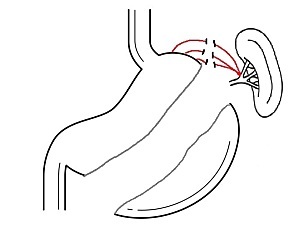The microbiota, the collective term for all the microorganisms living in the body, has been called the “forgotten organ” for its broad influence across many bodily systems. But in recent years, increased research focused on the microbiota—and the gut microbiota in particular—has meant that it’s not quite so forgotten anymore.
Investigators at Brigham and Women’s Hospital are undertaking a new project to look at the link between the microbiota and colorectal cancer. By harnessing unique partnerships among members of the Laboratory for Surgical and Metabolic Research, which includes many physician-scientists from the Division of General and Gastrointestinal Surgery, researchers hope to learn more about this connection. This includes taking a closer look at how bariatric surgery changes the microbiome along with the impact this connection may have on the development of colorectal cancer.
“We know that obesity and bariatric surgery are both on the rise,” says James Yoo, MD, a member of the Section of Colon and Rectal Surgery at the Brigham, who is co-leading the new research initiative. “In addition, colorectal cancer is one of the most common cancers in the world. The first step of this research is to try to understand some of the mechanisms that may connect the two.”
Looking at Complicated Connections
The aim of bariatric surgery is to alleviate obesity, a known risk factor for colorectal cancer and other cancers. “But although there is a lot of evidence in the literature that bariatric surgery and weight loss reduce the risk for more types of cancer, findings from studies looking at this connection for colorectal cancer, in particular, have been mixed,” says surgeon Eric G. Sheu, MD, PhD, who is the other co-leader of the research initiative. “Some studies have suggested that bariatric surgery may actually increase the risk of colorectal cancer.”
To get at the heart of this mystery, the team has turned to mouse models of bariatric surgery that had previously been established in the lab. Obese mice are treated with a gastric sleeve procedure similar to the one used in humans. Their feces are collected before and after the procedure and their microbiota are analyzed. (The same can be done in humans.)
“There are some specific types of changes in the microbiota we’ve observed that are consistent after bariatric surgery in both mice and patients,” Dr. Sheu says. “We’re working to understand which groups of organisms may mediate these changes on the microbe side and exactly what the changes are on the host side.”
Once these connections are made, one outcome of this research may be using certain strains or microbial signatures as a biomarker to determine which patients might need to be monitored more closely for the development of colorectal cancer after their bariatric surgery. According to Dr. Sheu, he and his colleagues are not able to narrow the connection down to particular strains. Rather, they are focused on trying to understand the mechanisms that may be involved.
Collaboration Enables Unique Studies
Collaboration is important not only for this research but for the work of the Laboratory for Surgical and Metabolic Research more broadly. The lab has several active areas of investigation involving animal models of surgery and translational studies of patients and patient samples.
In his other work, Dr. Yoo examines the molecular mechanisms in colorectal cancer signal transduction, which includes studying colitis-associated cancers. Dr. Sheu’s other research focuses on understanding the role of immunometabolism and the microbiome in type 2 diabetes resolution after bariatric surgery.
“The members of our lab are very collaborative, which allows for a lot of cross-specialty interactions,” Dr. Yoo says. “There’s a lot of research firepower at the Brigham, and being able to access all these resources and bring together people with seemingly different specialties allows us to address these complicated problems that would be difficult to tackle elsewhere.”
